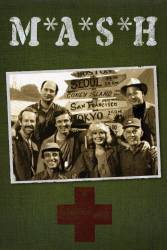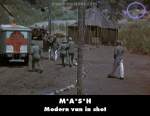Trivia: There were no American planes shot down over the Sea of Japan during the Korean conflict. It is rumoured that producer/director Larry Gelbart knew that, but wrote Henry Blake's death scene as he was very unhappy with the way Mclean Stevenson had left the show, and was determined to make it clear that there was no way he would be coming back.
Trivia: Gary Burghoff's left hand was slightly deformed, and he often hid it behind his clipboard during filming.
Trivia: Season 4. Episode 1 "Welcome to Korea". At the end of the episode the new commanding officer, Colonel Sherman Potter, played by Harry Morgan is introduced. In Season 3 Episode 1 "The General Flipped at Dawn", Harry Morgan played Major General Bartford Hamilton Steele.
Trivia: Early on in this episode a scene takes place in the shower between Harry Morgan and William Christopher. Right before the scene ends William pulls the chain on the lever for the shower to turn on, but the water doesn't come on; in fact when he notices the water doesn't come on, he holds onto the chain and the lever actually comes off. You can tell by his facial expressions this was totally unexpected, but since this was the end of the scene and no further dialog was needed, it was left in.
Trivia: Kario Salem, who played a youngster in season 4's "deluge" also played Private Weston in season 10's "follies of the living-concerns of the dead."
Trivia: In one episode, Hawkeye says to Radar, "You're a good man, Charlie Brown", a reference to the off-Broadway show of the same name based on Charles Schultz' Peanuts characters. Because the show didn't debut until 1967, this would appear to be a mistake, but it is not. The reference was intentional, an inside joke: Gary Burghoff played the title role in that play.
Trivia: While he was known for the role, William Christopher didn't play Father Mulcahy in the series' pilot.
Trivia: Season 2 Episode 5 "Dear Dad ... Three". Hawkeye and Trapper tell the racist soldier the story of Dr. Charles Drew. Drew was the inventor of techniques for separating and storing blood products. He was in a bad car accident and, legend has it, died because the 'whites only' hospital refused to give him a transfusion. This is an urban myth - he did die after that accident but was treated properly at the hospital. (00:23:00)
Trivia: The only actor from the movie who also played his role regularly on TV was Gary Burghoff (Radar). G. Wood appeared three times as Brigadier General Hammond, the same role he played in the movie.
Trivia: Timothy Brown, who plays Spearchucker Jones, was also in the 1970 film, listed as "Tim Brown", and played Corporal Judson.
Trivia: The only episode whose name was displayed during the broadcast run (as versus on the DVDs) was the final one, "Goodbye, Farewell and Amen."
Trivia: All of the characters, based on the characters from Richard Hooker's novel, were composites of people Hooker knew, met casually, worked with, or heard about.
Trivia: Stuart Margolin, who played Major Robbins (the plastic surgeon) in Season 2 Episode 18 "Operation Noselift" also played Captain Sherman (psychiatrist) in Season 1 Episode 7 "Bananas, Crackers and Nuts".
Trivia: The actor Mako (birthname Makoto Iwamatsu) played many different roles on MASH, usually Korean (North and South) and once Chinese. In the Korean roles, Mako spoke perfectly pronounced Korean even though he was Japanese (a naturalized American in 1956). Mako also served in the U.S. Army for awhile in the early 1950's, the same time MASH is set.
Trivia: Spearchucker Jones was removed from the series after the writers were informed that there were no black surgeons stationed at MASH (Mobile Army Surgical Hospital) units, during the Korean War.
Trivia: To show the horrors of war, Alan Alda had it written into his contract that there had to be at least one scene in each episode that took place inside the operating room. The exceptions are the episode 'Hawkeye', of season 4, where after Pierce is injured in a jeep accident the episode takes place at a Korean family's home, and the 4th season episode "The Bus". However in that episode the doctors treat the Korean soldier's leg injury on The Bus.







Answer: The C-42 was a military variant of the Douglas DC-2. Very few C-42's were built, so it's questionable that Potter would specifically have seen that particular model, but, given his military background, it's not entirely unreasonable that he might use the military designation even when the aircraft in question is actually a civilian DC-2.
Tailkinker ★